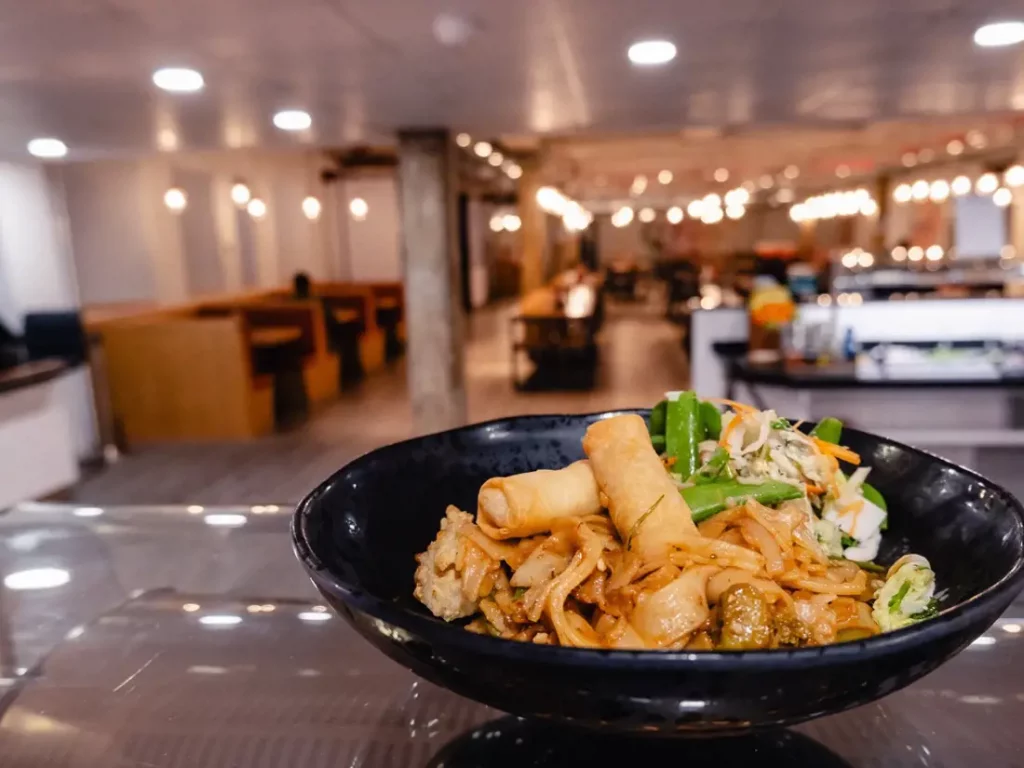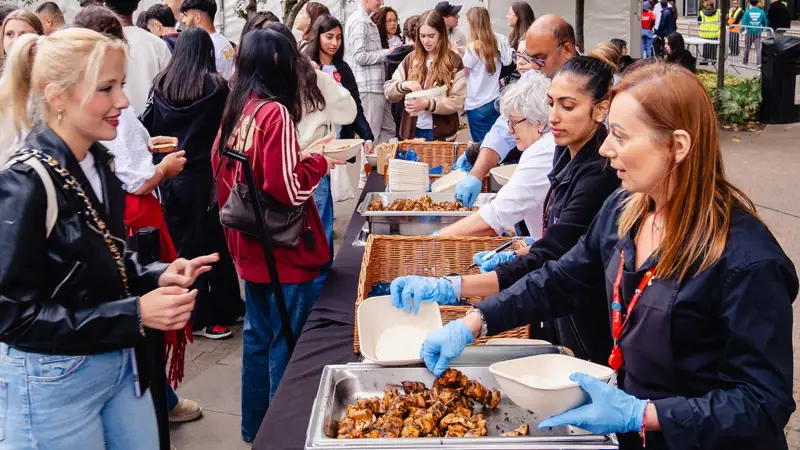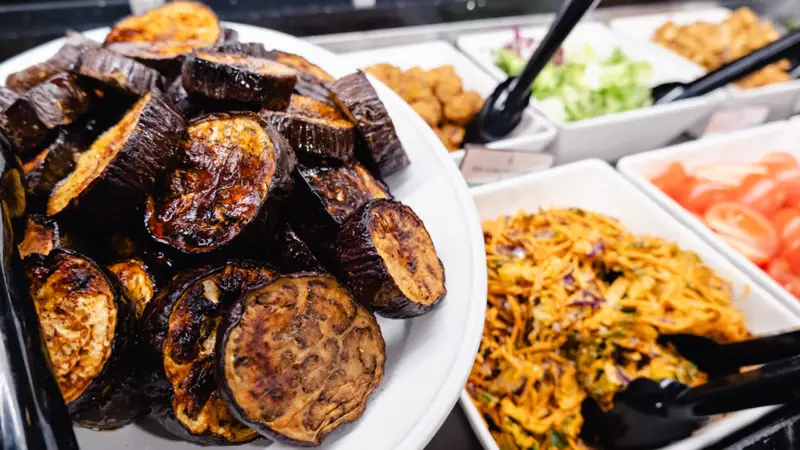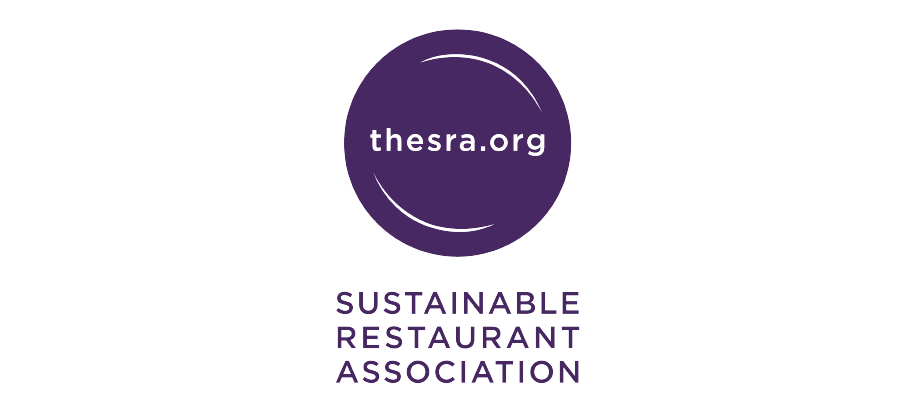More Plants, Better Meat: King's College London
26 September 2024
Share this exclusive content from Saladplate

Photo Credit: The Sustainable Restaurant Association (TRSA)
LISTED AS ONE OF THE TOP 10 UNIVERSITIES IN THE UK BY TIMES HIGHER EDUCATION RANKINGS 2024, KING’S COLLEGE LONDON (KCL) IS A WORLD-LEADING EDUCATIONAL FACILITY WITH FIVE CAMPUSES ACROSS THE CITY OF LONDON. THEY SIGNED UP TO THE FOOD MADE GOOD STANDARD IN 2018 AND, SINCE THEN, HAVE SHOWN A STEADY COMMITMENT TO IMPROVING THEIR PRACTICES YEAR-ON-YEAR.
We sat down with Retail Manager Lisa Connellan and Executive Chef Graeme Collie to learn how KCL continues to push the boundaries when it comes to sustainability in their food offering.
King’s College London prides itself on delivering world-leading research, enabling ground-breaking new discoveries and working to make the world a better place. “KCL’s operations and activities can have a significant impact on local and global environments, and we aim to minimise their negative effects while strengthening our positive impact through our research, teaching and actions,” says Executive Chef Graeme Collie. This approach is embedded throughout the College faculties, institutes and schools as well as King’s Food, the in-house catering team that manages the food and drink experience at King’s College London. “Our ambitious sustainability targets are underpinned by operational policies, plans, and systems,” says Lisa Connellan, Retail Manager for King’s Food, “demonstrating the decisive actions we are taking to reduce the negative impacts of our operations. As a leading research university, it’s important for us to make decisions that last longer than we do.”

Photo Credit: The Sustainable Restaurant Association (TRSA)

How King’s College London is Putting More Plants On the Menu
One of these decisive actions is a demonstrable and commendable commitment to serving a high proportion of plant-based dishes, with menus being 60% plant-based and 70% vegetarian. “We are actively reducing the consumption of meat and faux meat, serving more grains, seeds and a variety of plants,” explains Graeme. “There are significant health and environmental impacts to a more plant-rich diet, and we feel a responsibility to feed people’s bodies and minds, not just their appetites.”
Inspired by the Menus of Change Principles of Healthy, Sustainable Menus, the team has been developing their own menus that support a healthier community. As a result of these efforts, meals at KCL now contain on average 25g of protein. Lunchtime meals have reduced their salt content by 13% and increased their fibre by 30% per meal, a figure that equates to two additional adult portions of vegetables. Recognising the importance of communication with their customers, their marketing taglines include ‘fast food, not junk food’ and ‘quality, not quantity’.
One initiative of which Graeme is especially proud is that the kitchen has removed all dairy products from their cooking process. “This was a challenge while producing desserts,” he says, “but our chefs worked to recreate the same mouthfeel, textures and tastes using white beans.” Their dessert pots now meet legal criteria for making nutritioan and health claims on foods. “Specifically, our mini lemon and vanilla pot and our mini chocolate and raspberry pot are both sources of protein and fibre, and our mini orange and cinnamon pot is a source of fibre and low in salt, almost qualifying as a source of protein, too.”

Lisa observes that deliberately building menus around more plant-based foods is a concept that can appeal to all customers, of all demographics. “If it’s marketed right, this is a way to demonstrate that you care not only about the welfare of animals and the planet, but about your customers, too.”
Recognising that meat is still often the biggest seller when it is on the menu, the next move for King’s Food is to ensure their sales mix reflects their product mix while exploring the idea of ‘better meat’. “We want to focus much more on the quality of our meat. We also want to feature more mixed recipes, where we include less meat and more plant protein within the same dish,” says Graeme. “Plus, we’re currently aligning our retail ranges to reflect the food that we produce in-house,” adds Lisa, “so that means more wholegrains and less salt and sugar.”
Food Made Good at King’s College London
KCL first signed up to the Food Made Good Standard in 2018. “Originally, a colleague found The SRA because they were looking for some kind of accreditation that would give structure and direction to our department’s sustainability efforts,” says Lisa. “They felt that having an assessment by an external organisation would add credibility to their arguments and give us something to aim for. Moving forward, when Graeme and I joined King’s, we found the Standard to be a robust, all-round accreditation; it’s about much more than just food. It gives us a robust Framework to work within and encourages us to push our suppliers for more detailed information on provenance.”

“Following the recommendations of the Food Made Good Standard and making the changes we’ve made to our business has been a journey,” Lisa continues. “We have had to develop our team to get buy-in for where we are going and what we are trying to achieve, and we have made mistakes along the way.” This hard work continues to pay off, however, with significant and consistent improvements each time they go through the Standard evaluation. “In 2018, we earned one star with 59%. The following year, we got this up to two stars and 68%. In 2022, we got three stars, with 80% – and in 2024, we’ve achieved three stars and 94%!”
Lisa credits this incredible progress with the University’s winning a variety of sector-specific awards over the last 12 months: a Green Gown Award, four public sector catering awards, one U Dine Award, three TUCO Awards and four nominations for the CATEY Awards, as well as several of their chefs winning competitions.
“This signifies we have made the right decisions and are heading in the right direction; we are leading the way in university catering,” adds Graeme as we bring our conversation to a close. “This helps with stakeholder engagement, staff development and retention and puts pressure on our supply chain that will make it easier for those that follow us.”

Photo Credit: The Sustainable Restaurant Association (TRSA)

Source: The Sustainable Restaurant Association



